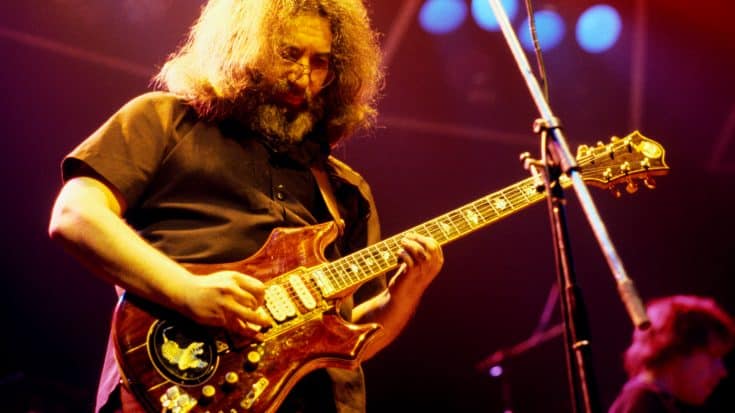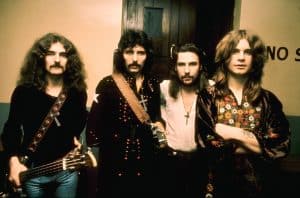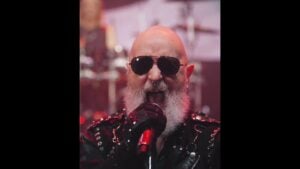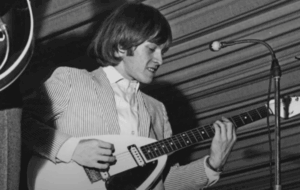The Strange Inspiration Behind The Grateful Dead’s “Alligator”

Jerry Garcia of The Grateful Dead performs on stage, Wembley Empire Pool, London, 7th April 1972. (Photo by Michael Putland/Getty Images)
Even in 1972, devoted fans of the Grateful Dead, known as hardcore Deadheads, continued to request the song “Alligator.” The band had undergone significant changes since the song’s creation in 1967, but some fans still longed for the intense psychedelic sound of the early days. However, the Dead were not fond of entertaining hecklers or being told what to do, so they responded in their typical fashion by bantering with the audience.
“Hey, for all you ‘Alligator’ fans out there…we understand there’s a lot of ‘Alligator’ fans out there, but we done forgot it, see,” Phil Lesh told the crowd at the Academy of Music on March 28th, 1972, just before the band went on their Europe 72 tour. “And so we’re gonna have to remember it sometime later, you know.”
The Absence of Pigpen
When the band returned to their American engagements later that year, it was without keyboardist/vocalist Ron ‘Pigpen’ McKernan, who sang lead on “Alligator.” “‘Alligator’? Did you just say “Alligator”?” Bob Weir inquired on July 18th, 1972, after hearing a request for the track at Roosevelt Stadium in Jersey City, New Jersey. Lesh then entered to secure the hammer. Lesh told the crowd:
“We don’t do that tune no more, man. It done faded away in the mists of time.
“As you all might have figured out by now, we can’t do any Pigpen songs because Pigpen ain’t here.”
“Alligator” was an unexpected classic associated with Pigpen. It originally appeared on the band’s 1968 album/live compilation Anthem of the Sun. The track diverged from Pigpen’s usual repertoire of traditional blues and energetic rock songs. “Alligator” had eccentric lyrics, extended jam sessions, and an unconventional structure. While this may have been atypical for Pigpen, he and the rest of the Dead collaborated to create the song in a moment of creative unity.
Playing Tricks on Vacationers
In May of 1967, the Dead accepted an invitation from their friend John Warnecke, whose father owned a vacation home along the Russian River north of San Francisco. The band members stayed in several cabins on the property, and they set up a stage and sound system near the riverside. During their stay, the Dead amused themselves by using their PA system to produce animal sounds and startle unsuspecting vacationers.
“I don’t know if any kayaker actually fell over from the shock of what sounded like a giant 80-foot bullfrog or anything,” drummer Bill Kreutzmann recalls in Deal: My Three Decades of Drumming, Dreams, and Drugs with the Grateful Dead, “but we sure tried.”
Amidst their playful antics, the Dead also focused on composing music. The initial group improvisations for “Dark Star” are said to have begun alongside the Russian River. Additionally, Lesh and Pigpen drew inspiration from the aquatic surroundings to complete what would become “Alligator.”
The band had already experimented with the song’s basic structure as early as January 1967, but it was during their exploration of the Russian River that Lesh and Pigpen specifically honed in on the idea of the alligator.
Hunter and the Dead
The Dead had a new partner within their clan when they returned to San Francisco. Robert Hunter had been Jerry Garcia’s close buddy since the early 1960s when the two were each attempting to make their place in the Palo Alto folk scene.
Following a trip to New Mexico, Hunter began writing poetry that would serve as the lyrical foundation for songs such as “China Cat Sunflower” and “St. Stephen.”
Some lines of poetry would later be included in the lyrics of “Alligator” (Pigpen was also responsible for sections of the lyrics, with Lesh possibly contributing some of his own). “Alligator” would be completely established when the Dead and Hunter’s friendship was confirmed.

















